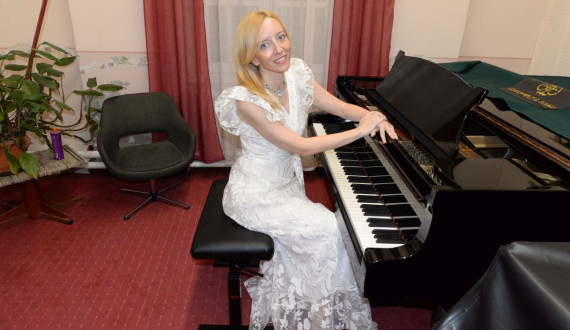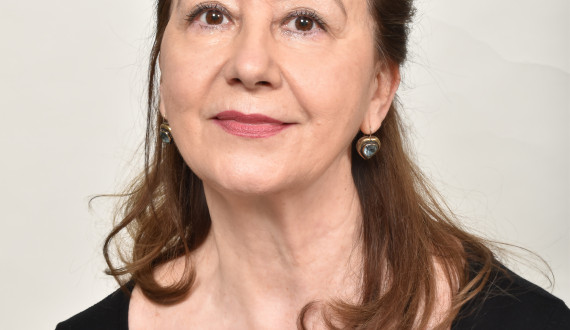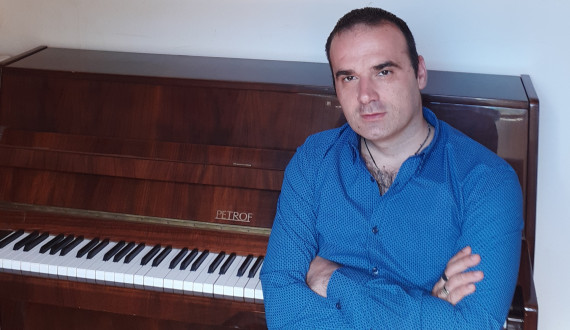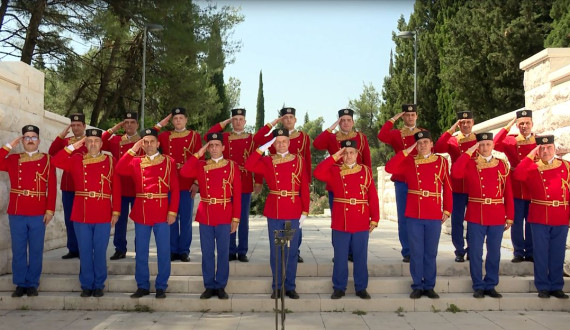MONTENEGRIN MUSIC ANNIVERSARIES
2021-08-02 21:00
Cinema Square
Monday, August 2
Cinema Square, 9 p.m.
MONTENEGRIN MUSIC ANNIVERSARIES
SPEAKERS
MARIJANA KOKANOVIĆ MARKOVIĆ, PhD (Serbia)
LUKA I. MILUNOVIĆ (Montenegro)
DOBRILA POPOVIĆ, MА (Montenegro)
IVANA MARIĆ, PhD (Montenegro)
MUSIC PROGRAM
ALEKSANDRA MAGUD, soprano
DEJAN KRIVOKAPIĆ, piano
Jovan Ivanišević (1861–1889)
Slovenskim Sejama Ljubičice Srpskih Gora [Violets of Serbian Mountains to Slavic Ladies]
Kaži mi Kaži [Tell me, Tell]
Sećanje [Memory]
Ala je Lep ovaj Svet [It's a Beautiful World]
MILITARY ORCHESTRA (Montenegro)
MILO BELEVIĆ, conductor (Montenegro)
Raffaele Ascolese (1855–1923)
Montenegro
His Royal Highness
Nikita Fest March
Angelo Montanari (1849–1921)
The Savoja – Petrović
Prince Mirko Petrović (1879–1918)
Ferdinand March
Pilade Benati (1836–1915)
Živio Savoja – Petrović [Live long the Savoja – Petrović]

Marijana Kokanović Marković PhD, Associate Professor at the Department of Musicology and Ethnomusicology of the Academy of Arts at the University of Novi Sad, graduated first in Music Pedagogy and then in Musicology, before going on to earn her master’s degree and PhD (in Musicology) from the Academy of Arts in Novi Sad. She has participated in numerous congresses and projects, in the country and abroad. Marijana Kokanović Marković published the monograph The Social Role of Salon Music in the Lives and System of Values of Serbian Citizens in the 19th Century (Belgrade, 2014), and co-authored with Lada Duraković the book Franz Lehár – Bandmaster of the Imperial and Royal Navy in Pula (1894−1896) (Pula, 2020). She is the author of numerous studies published in national and international journals and collections of papers, as well as of lexicographic articles (Serbian Biographical Dictionary, Serbian Encyclopedia, Österreichisches Musiklexikon online, and Grove Music Online). Marijana Kokanović Marković co-edited the first book of collected works by K. Stanković, Kornelije Stanković ̶ Piano Music (Belgrade, Novi Sad, 2004) and an album of salon dances for piano ̶ From Salons of Novi Sad (Novi Sad, 2010). The focus of her scientific interests is 19th century music, and especially popular genres (salon and military music and operetta) in Serbian, Balkan, and European contexts.

Luka Ilijin Milunović completed elementary and Grammar school in Cetinje. He studied at the Faculty of Economics in Titograd and Belgrade. He has published works on the economic (tourism), the ecological (forestry, hunting), and, predominantly, the cultural (theater) past of Montenegro, as well as on chess, being an international FIDE judge. Luka I. Milunović has participated in about ten major national and international projects. He has edited about twenty monographs and was the editor-in-chief of the periodicals: Dani Skadarskog Jezera, Jezerski Vrh, and Soa Nebeska (Issues 25-30). He has served as a CEO and a member of publishing councils (Ars, 1986/88; Cetinjski List, 1989/90), and on the editorial board of the journals: Montelovac, Arhivski Zapisi, and Gledišta. Luka I. Milunović has participated in eleven scientific conferences. He has published more than 500 studies in scientific, professional, and general periodicals in the form of essays and contributions, as well as sixteen special contributions in monographs. He is one of the editors of five special monographs and a four-volume edition of encyclopedic character. Luka I. Milunović is a co-author of two exhibitions of documents. Independently, he is the author of four and the editor of six monographs, as well as the editor-in-chief of one collection of papers. He has been awarded around 30 special official recognitions and awards by institutions and organizations from Montenegro and abroad.

Dobrila Popović MА, Advisor for Music at the Ministry of Culture of Montenegro, completed her undergraduate and postgraduate studies in Harmony and Harmonic Analysis at the Faculty of Music in Belgrade. She completed her specialization studies at the Santa Cecilia State Conservatory in Rome in Composition with Professor Mauro Bortolotti. For several years, Dobrila Popović taught Solfeggio and Harmony with Harmonic Analysis at the secondary music school and the Music Academy in Podgorica. In cooperation with the Institute for Textbook Publishing and Teaching Aids in Podgorica, she has been a long-time reviewer for textbooks in Music Culture and is one of the authors of textbooks, manuals for teachers, and CD materials for Music 7, Music 9 and Music Culture 9. In the renovated National Theater in Podgorica, Dobrila Popović has established concert activities as one of the theater’s segments. She has organized numerous concerts dedicated to the promotion of young talents, as well as concerts of prominent musicians from the country and abroad. She has prepared several international cooperation projects for which she was awarded in Italy with the Societa Dante Alighieri Reggio Calabria Medal and the Accademia Hipponiana Vibo Valencia Medal, as well as in Greece with the Apostolopoulos Association Medal.

Ivana Marić PhD graduated from the Faculty of Music in Belgrade in the Department of Music Pedagogy. She completed her postgraduate studies at the Academy of Music in Cetinje, and defended her doctoral dissertation Sacred Music by XX Century Composers from Kotor, Tripo Tomas, Antun Homen, Ivan Brkanović, and Antun Kopitović, with Special Reference to Harmonic Language at the Music Academy of the University of Zagreb. Ivana Marić is the author of several papers published in eminent national and international scientific journals, primarily in the Yearbook of the Kotor Maritime Museum, Boka – a journal of science, culture, and art from Herceg Novi, Vaspitanje i Obrazovanje from Podgorica, Gazette of the Montenegrin Academy of Sciences and Arts Art Department in Podgorica, Bokeški Ljetopis from Kotor, and the Pasionska Baština from Zagreb, as well as in proceedings of international scientific conferences. Her papers cover history and theory of music, music harmony, musical forms, counterpoint, and vocal repertoire analysis, yet also examine theory of drama, linguistics, and other fields. Ivana Marić started her teaching career at the Vida Matjan Primary and Secondary Music School in Kotor. She lives and works in Kotor. She is a member of the Montenegrin Academy of Sciences and the Arts Music Committee in Podgorica.

Aleksandra Magud, soprano, completed primary and secondary music school in Kotor, under Professor Mirela Šćasni. She graduated from the Music Academy in Sarajevo, under Professor Georgija Minova. Aleksandra Magud has participated in several national and international competitions and won numerous awards. During her studies, she was twice awarded for having the best GPA of the academic year. She is a soloist of the Jedinstvo Serbian Singing Society Choir, with whom she has notable performances in the country and abroad. Aleksandra Magud received her master’s degree under the famous Radmila Bakočević at the Faculty of Music in Belgrade. She works as a professor of Vocal Arts at the Vida Matjan Primary and Secondary Music School in Kotor.

Dejan Krivokapić, piano, completed primary and secondary music school in Kotor. He continued his education at the Music Academy in East Sarajevo, where he graduated from the Piano Department under Professor Dejan Stošić. Dejan Krivokapić completed his postgraduate studies in Piano at the Academy of Arts in Bijeljina under Professor Aleksandra Radosavljević. Starting in 2010, he worked at the primary music school in Herceg Novi as a piano teacher, and since 2014 he has been engaged at the Vida Matjan Primary and Secondary Music School in Kotor. Dejan Krivokapić has achieved notable results with his students, as evidenced by numerous awards at national and international competitions. He performs as a soloist and is a member of several chamber ensembles.

Montenegrin Military Music was founded at the end of 1871, when the Montenegrin government hired conductor Anton Šulc. After the Second World War, by the decision of the Supreme Command of the Federal People’s Republic of Yugoslavia, in 1949, a vast number of smaller and larger orchestras were formed in the garrisons meeting the needs of the Army and citizens. The Central Orchestra for the territory of Montenegro was formed in the then Titograd (now Podgorica), where the golden age of the military orchestra began. They nurtured music of all periods with a special emphasis on the popular music of the second half of the 20th century. The main task of the Orchestra was to participate in state and military protocols, but also to connect the army and the people by holding public concerts. The Military Orchestra has performed at many large-scale events, such as the 1984 Winter Olympics in Sarajevo, the Belgrade Military Song Festival in Belgrade, the International Meetings of Orchestras in Sarajevo, and the Jazz Festival in Podgorica. They have also performed with the military orchestras of Northern Macedonia, Greece, Albania, Bulgaria, Slovenia, and the United Kingdom. They participated in the theatrical play Bure Baruta of the Cetinje National Theater.
